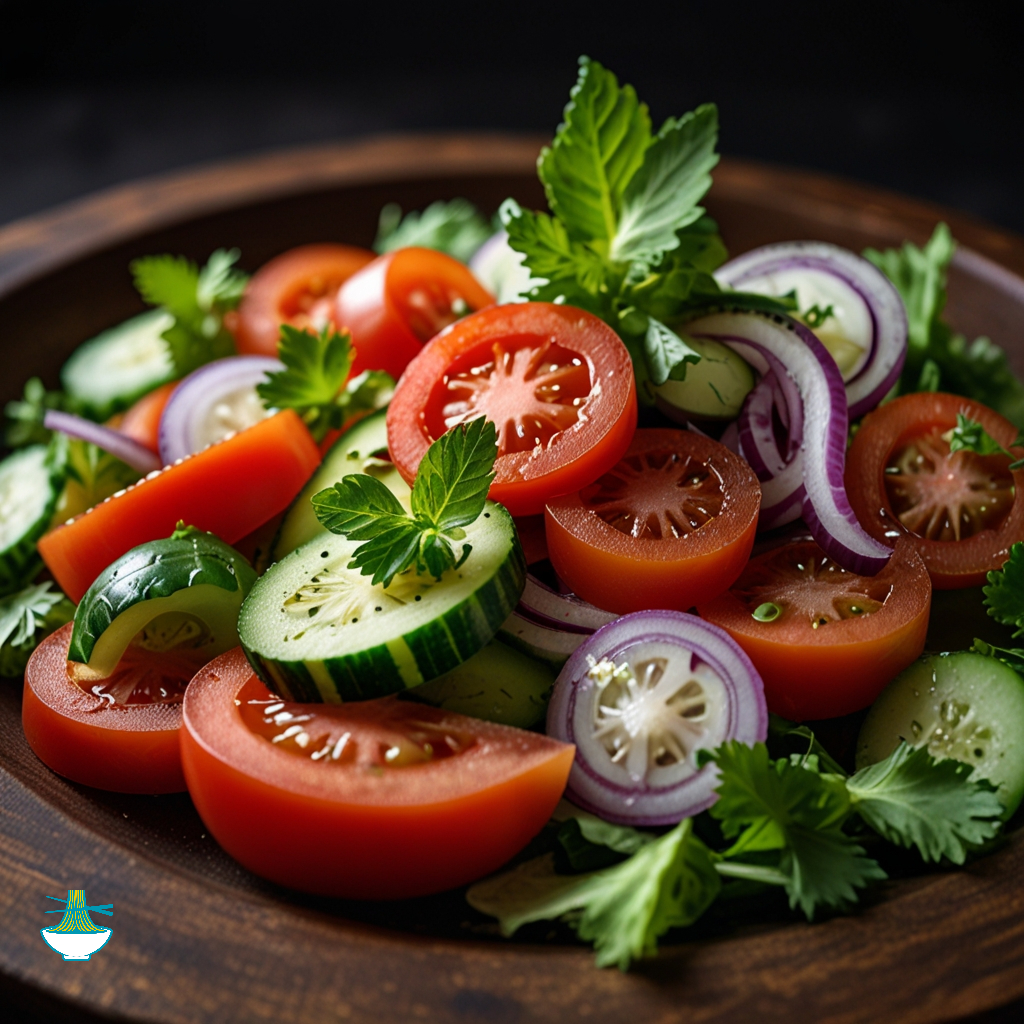Originating from the rich culinary heritage of the Mediterranean region, Eksme salad is a vibrant combination of fresh tomatoes, crisp onions, fragrant herbs, and sometimes cucumbers. This refreshing dish encapsulates the essence of simplicity and healthfulness, making it a beloved staple in many cultures.
The history of Eksme salad traces back to ancient times when communities relied on locally grown ingredients to create nourishing meals. Over the years, variations of this recipe have emerged, each reflecting the unique tastes and culinary traditions of different regions.
With its bright colors and invigorating flavors, Eksme salad has transcended borders and become a popular choice for those seeking a light and flavorful dish. Whether enjoyed as a side dish or a standalone meal, its harmonious blend of ingredients continues to captivate taste buds around the world, showcasing the enduring appeal of Mediterranean cuisine.
Ingredients:
- Ripe tomatoes
- Onions
- Fresh herbs (such as parsley and mint)
- Cucumbers (optional)
- Olive oil
- Lemon juice or vinegar
- Salt and pepper to taste
Method:
1. Dice the tomatoes and onions into small, uniform pieces. If using cucumbers, peel them and dice them as well.
2. Finely chop the fresh herbs.
3. In a mixing bowl, combine the diced tomatoes, onions, and herbs. If using cucumbers, add them to the bowl as well.
4. Drizzle olive oil over the salad according to your preference.
5. Squeeze fresh lemon juice or add vinegar to taste.
6. Season with salt and pepper, then gently toss the ingredients until well combined.
7. Let the salad sit for a few minutes to allow the flavors to meld together.
8. Serve chilled or at room temperature as a refreshing side dish or a light meal.
Enjoy this simple yet flavorful Eksme salad as a taste of the Mediterranean!
Nutrition Value:
1. Ripe Tomatoes:
- Calories: Approximately 18 calories per 100g
- Carbohydrates: Around 3.9g per 100g
- Protein: About 0.9g per 100g
- Fat: Negligible amounts
- Sodium: Low
- Cholesterol: None
- Vitamins: Rich in vitamin C, vitamin A, vitamin K, and various B vitamins
- Minerals: Contains potassium, manganese, and other minerals
- Nutritional Benefit: Tomatoes are an excellent source of antioxidants, particularly lycopene, which may help reduce the risk of chronic diseases and promote heart health. They are also hydrating and contribute to overall hydration.
2. Onions:
- Calories: Around 40 calories per 100g
- Carbohydrates: Approximately 9.3g per 100g
- Protein: About 1.1g per 100g
- Fat: Negligible amounts
- Sodium: Low
- Cholesterol: None
- Vitamins: High in vitamin C, vitamin B6, and folate
- Minerals: Contains potassium, magnesium, and phosphorus
- Nutritional Benefit: Onions are rich in antioxidants and anti-inflammatory compounds. They may help boost immune function, regulate blood sugar levels, and support heart health. Additionally, they add flavor and texture to dishes without adding many calories.
3. Fresh Herbs (such as Parsley and Mint):
- Calories: Varies (usually very low)
- Carbohydrates: Minimal
- Protein: Minimal
- Fat: Minimal
- Sodium: Minimal
- Cholesterol: None
- Vitamins: High in vitamin K, vitamin C, and various other vitamins depending on the herb
- Minerals: Rich in calcium, iron, and potassium
- Nutritional Benefit: Fresh herbs are packed with antioxidants and essential nutrients. They can aid digestion, promote healthy skin, and add a burst of flavor to dishes without extra calories or sodium.
4. Cucumbers (Optional):
- Calories: Approximately 15 calories per 100g
- Carbohydrates: Around 3.6g per 100g
- Protein: About 0.6g per 100g
- Fat: Negligible amounts
- Sodium: Low
- Cholesterol: None
- Vitamins: Contains vitamin K, vitamin C, and various B vitamins
- Minerals: Rich in potassium and magnesium
- Nutritional Benefit: Cucumbers are hydrating and low in calories, making them a refreshing addition to salads. They provide vitamins and minerals, support hydration, and contribute to overall satiety.
5. Olive Oil:
- Calories: Approximately 120 calories per tablespoon (15ml)
- Carbohydrates: Negligible amounts
- Protein: Negligible amounts
- Fat: Around 14g per tablespoon, predominantly monounsaturated fat
- Sodium: Low
- Cholesterol: None
- Vitamins: Contains vitamin E, a fat-soluble antioxidant
- Minerals: Negligible amounts
- Nutritional Benefit: Olive oil is a source of healthy fats, particularly monounsaturated fats, which may help reduce the risk of heart disease. It also provides antioxidants and adds richness and flavor to dishes.
6. Lemon Juice or Vinegar:
- Calories: Minimal
- Carbohydrates: Negligible amounts
- Protein: Negligible amounts
- Fat: Negligible amounts
- Sodium: Low
- Cholesterol: None
- Vitamins: Contains vitamin C and small amounts of other vitamins depending on the type
- Minerals: Minimal
- Nutritional Benefit: Lemon juice or vinegar adds acidity and brightness to dishes without extra calories or sodium. They provide a burst of flavor and may aid digestion.
7. Salt and Pepper (to taste):
- Calories: Negligible
- Carbohydrates: Negligible
- Protein: Negligible
- Fat: Negligible
- Sodium: Provides sodium, but intake should be moderated
- Cholesterol: None
- Vitamins: None
- Minerals: Salt provides sodium, an essential mineral for fluid balance and nerve function
- Nutritional Benefit: Salt and pepper enhance the flavor of dishes, but excessive salt intake may contribute to high blood pressure. Moderation is key.
These ingredients, when combined, create a nutritious and flavorful salad that is rich in vitamins, minerals, and antioxidants while being low in calories and unhealthy fats. Enjoying Eksme salad as part of a balanced diet can contribute to overall health and well-being.


Comments